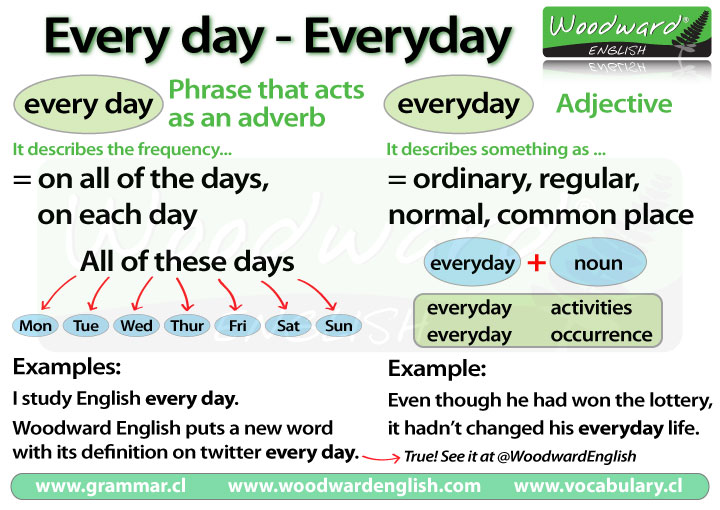Every day vs. Everyday
English Grammar
A common mistake in English is the correct use of the words everyday and every day. Don't worry, this is also a mistake commonly made by native speakers too.
The word everyday (one word) and phrase every day (two words) are not interchangeable.
The difference between everyday and every day.
Everyday is an adjective so it goes before the noun it describes.
Everyday = ordinary, regular, normal or commonplace. It can refer to something done or used daily or routinely.
- You should wear an elegant dress for the wedding, not just an everyday one.
- Even though he has won some money, it hasn't changed his everyday life.
- Some everyday activities damage the environment.
- Why do you always use those big words that are not common in everyday language?
Every day is a phrase that usually acts as an adverb.
Every day = all of the days or each day over a period of time. It can also mean very regularly.
- You've been wearing that same shirt every day this week. You need to change it!
- You should take a shower every day.
- Low prices, every day! (A sign in a shop)
- Woodward English publishes new material on Twitter every day.
How to know when to use every day or everyday.
To know which of the words to use in your sentence, replace the word(s) with each day.
If it sounds correct, then write every day (two words).
If it doesn't sound correct (usually because it is before a noun) then use everyday (one word).
For example:
- I do exercises every day. (correct)
- I do exercises each day - This sound correct so we use every day (two words)
- It's not an every day event. (incorrect)
- It's not an each day event. - This doesn't sound correct so we use everyday (one word)
Another way of doing this is by replacing the word(s) with ordinary.
If it sounds correct, then write everyday (one word).
If it doesn't sound correct then use every day (two words).
For example:
- I do exercises everyday. (incorrect)
- I do exercises ordinary - This does not sound correct so we use every day (two words)
- It's not an everyday event. (correct)
- It's not an ordinary event. - This sounds correct so we use everyday (one word)
Another tip is that the word everyday is followed by a noun and is not used by itself at the end of a sentence.
Pronunciation of Every day and Everyday.
The main difference in pronunciation between every day and everyday is where the accent (or word stress) is placed.
Everyday: the stress is on the first syllable … EVeryday.
Every day: the stress is on the word day … every DAY.
Summary Chart

Next activities
Try our interactive game to practice the difference between Every day and Everyday.
See our notes about the difference between Every day and All day and All vs Every vs Each.
If you found this English Grammar about Every day vs. Everyday interesting or useful, let others know about it.
